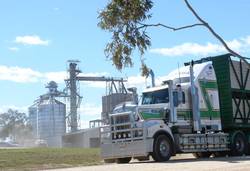Queensland Country Life | 3 August 2021
Supercharged ag investors see value in more than farmland
by Andrew Marshall
Supercharged ag investors see value in more than farmland
by Andrew Marshall
Investors have done the maths and are suddenly supercharged with interest in agriculture - and not just farmland.
The sector's ability to defy droughts and the coronavirus pandemic to (mostly) deliver solid long term returns from raw commodities and value-added processing and marketing ventures has generated a burst of sophisticated investor interest across the ag supply chain.
Agriculture, long overlooked as a handy defensive investment space by fund managers more interested in infrastructure, commercial real estate and shopping centres, has become the focus of big spending activity of late.
The past few months alone have seen Auscott's NSW farming, cotton ginning and marketing assets sold to enthusiastic ag investor PSP for more than $500 million, Australia's biggest piggery Rivalea and related processing business, bought by global meat giant JBS, and Macquarie Bank outbidding private equity group Roc Partners to pay about $360m for Vitalharvest, one of the country's biggest berry and citrus farmland owners.
Sydney-based Roc has been typical of the new-found, local investment community faith in the farm sector.
In just a few years it has amassed diverse agribusiness interests ranging from Capilano Honey to oyster production, the commodity marketer Emerald Grain, big Wagyu beef producer Stone Axe, chicken grower ProTen and horticultural glasshouses.
Stoked up
Cheap interest rates, strong farm commodity prices, much improved seasons and last year's bumper winter harvest have helped stoke ag's current fervor.
Numerous high value landholdings have subsequently hit the market as hopeful vendors try to cash in on the investment activity.
They include Macquarie's 105,000 hectare NSW and West Australia grain growing jewel Lawson Grains, potentially worth about $600m, and various beef holdings covering almost 2m hectares in WA, the Northern Territory owned by Hancock Prospecting and its subsidiary S. Kidman and Company, tipped to fetch about $300m, and 49 farms across south-eastern Australia owned by US-based Proterra Investment Partners.
In June Stanbroke Pastoral Company sold its Queensland Gulf Country station Miranda Downs for $180m to Hughes Pastoral Group.
Not even COVID-19 lockdowns and labour shortages have deterred the surge of interest in rural property and associated operations.
The COVID factor
"In fact, the food and agriculture mood has actually been supercharged by COVID," said food and agribusiness partner with financial services giant PwC, Greg Quinn.
"Food availability and healthy eating are suddenly what everybody is thinking about.
"And people aren't just thinking about food for themselves - there's a boom in pet ownership, pet services and premium pet food spending.
"Pet food business multiples are going through the roof."
Three years ago Chinese agribusiness New Hope Group paid $1 billion for Australia's Real Pet Food Company (VIP Pet Foods), which has seven plants in Queensland, NSW and New Zealand, while prominent US private equity group KKR jumped in to buy NZ's Natural Pet Food Group.
Mr Quinn, who pulled together the sale Auscott's assets to the PSP-backed Australian Food and Fibre, said traditionally big investor interest in agriculture was largely in property, but now buyers also had value-added opportunities in their sights.
The Canadian-owned PSP pension fund group started its foray into Australia last decade buying farmland, but quickly worked out there was extra money in incorporating processing and marketing, including in meat, nuts, cotton and horticulture.
Post-farmgate margins
"Post-farmgate processing gives you leverage to get more end market efficiencies and returns," said PSP resource division boss Marc Drouin.
About 80 per cent of Auscott's considerable ginning and marketing business comes from other growers' cotton.
PwC's Mr Quinn said some farmers looking to attract investment fund or private wealth group backing were prepping their operations for sale by accumulating processing infrastructure or teaming with neighbours to offer a package with more scale and cash flow credentials.
In May Ontario Teachers Pension Fund's AustOn Corporation paid what is believed to be more than $70m to support four Goulburn Valley family orchardists in northern Victoria who combined their marketing and packing interests to now trade as Pomona Valley Orchards.
Pomona Valley's 500ha of apples, pears, cherries and stone fruit trees are serviced by the OzPac Australia and Integrity Fruit packing businesses, which handle fruit from other orchards, too.
"This group spent time working together with a board structure and a co-operative business approach which involved more than just growing fruit," Mr Quinn said.
'Going long' in ag
He said the past two years had seen competition for farmland and aligned agribusiness assets ramp up as domestic superannuation funds, and equity players partnering with super funds, recognised the sector's global growth and returns, and the wisdom of "going long in ag".
While big financial groups were still investing long term in infrastructure dividends, COVID-19 lockdowns had taken the gloss off commercial real estate, tourist resorts and airports.
"Ag's relatively stable long term returns and rising asset valuations are a quite appealing long term bet," Mr Quinn said.
"Even in recent years during the worst droughts in memory, asset values went up and commodity prices held strong.
"In fact, ag's been performing through droughts for the past 20 or 30 years."
New generation drivers
New technology was also enabling many producers to improve their margins by becoming more integrated via new marketing, storage, logistics and value-adding pursuits, "cutting out some of the middle men".
At the same time a "succession generation" of family members were seizing opportunities to beef up their farming enterprises, taking advantage of technology, new markets and the chance to buy retiring neighbours' holdings.
"Family farmers are actually the most aggressive bidders, not overseas investors or private equity groups," Mr Quinn said.
"They know the value in bolting on the farm next door, and they know it won't be back on the market for quite some time.
"They want it now."












